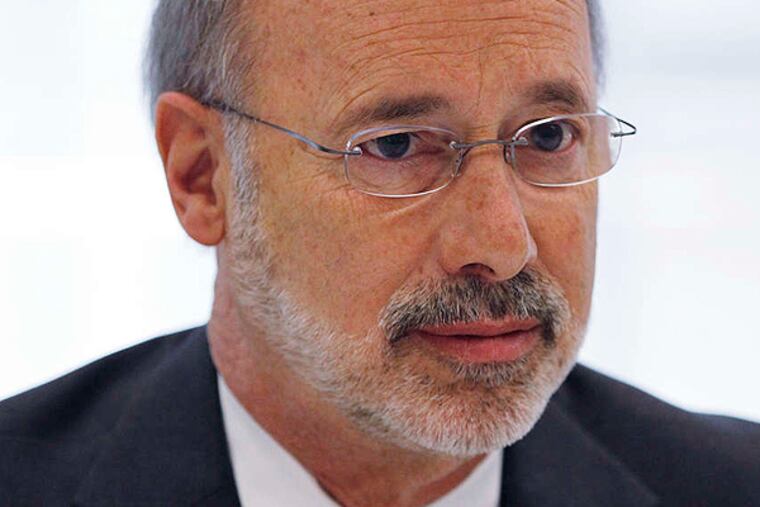Wolf likely will face difficult dealings with GOP
Pennsylvania's governor-elect was brimming with excitement Tuesday night as he claimed victory before a hometown crowd at the Utz Arena in York.

Pennsylvania's governor-elect was brimming with excitement Tuesday night as he claimed victory before a hometown crowd at the Utz Arena in York.
"Let's get started," Democrat Tom Wolf said.
Wolf has an ambitious agenda, but he will likely face a massive budget deficit when he takes over the executive suite on the second floor of the Capitol in January - and the legislative chambers downstairs will be dominated even more by Republicans, many resistant to new spending or taxes.
During the campaign, Wolf promised a big increase in the state's share of funding for public schools, a 5 percent severance tax on Marcellus Shale natural gas, and a restructuring of the state's flat-rate personal income tax so the wealthy would pay more.
GOP legislative leaders said last week that they looked forward to working with Wolf, but at the same time made clear that new taxes and increased spending would be a tough sell.
"We haven't seen detailed proposals from Tom Wolf, but the general outline of his campaign was more taxes and more spending - and that has never been a policy position that would get support from the Senate Republican caucus," Majority Leader Dominic Pileggi said last week.
And Pileggi, of Delaware County, is a moderate. Next week, he faces a challenge from more conservative colleagues who want to oust him as majority leader. If that coup succeeds, Wolf's task could become more complicated.
"He's got an incredible challenge to overcome the polarization and partisanship in the legislature," said pollster and political scientist G. Terry Madonna of Franklin and Marshall College. "It's not the old days. . . . The Republicans aren't even seeing eye to eye."
While Wolf was racking up his win, Pennsylvania voters were increasing the GOP hold on the legislative branch, to 119-84 in the House and 30-20 in the Senate.
Wolf has a "reasonable chance" of getting a shale gas tax enacted, Madonna said, if only because he and lawmakers will need to find new revenue to plug a projected budget deficit. That, of course, is no sure thing.
House Majority Leader Mike Turzai (R., Allegheny) said he planned a renewed push for his top priority: privatizing the state's liquor stores. In 2013, the House passed his proposal - a historic high watermark - before it stalled in the Senate.
"There is going to be discussion of revenue; it has to start with liquor privatization," Turzai told the Pittsburgh Post-Gazette.
Wolf opposes selling off the State Stores; he has said the system could be modernized to provide more choice and flexibility for consumers. The United Food and Commercial Workers union, which represents Liquor Control Board clerks, gave Wolf's campaign $150,000.
Sharon Ward, executive director of the liberal-leaning Pennsylvania Budget and Policy Center, said the budget for the current fiscal year, though delivered on time, was balanced using a slew of one-time revenue sources that will leave a roughly $2 billion gap.
"I think the situation is almost as dire as it was in the first year of the recession," Ward said. "There is no 'rainy day' fund. A lot of the special funds are depleted. They can't use the same tricks and gimmicks they have been using. The well is really dry."
Wolf, she noted, has pledged to begin restoring money to public education through a new shale gas tax, which her center has estimated would raise about $1 billion. GOP budget aides say the take would likely be far less.
It might be harder for Wolf to direct that money to schools if he runs into resistance from the legislature on that proposal or on other ways to raise revenue, she said.
State Sen. Daylin Leach (D., Montgomery) said he thought Wolf's personality alone might make for a smoother ride with the Republican legislature than Gov. Corbett had with members of his own party.
"Corbett never had an interest in building relationships with either party," Leach said. "He didn't speak to them, didn't consult with them, did things they thought undermined them." He predicted that if Wolf "keeps his word and reaches out on a policy and a social level, I think he'll find a number of Republicans willing to work with him and get some things done."
Wolf spokesman Jeffrey Sheridan said the governor-elect had begun talking with legislative leaders.
Former Gov. Ed Rendell, for whom Wolf once worked as secretary of revenue, said the governor-elect's extensive business experience in matters such as negotiating with suppliers and customers had prepared him well for the give-and-take of dealing with the legislature.
"He's got to be clear about his objectives and be willing to accept some of their suggestions and modifications," Rendell said. "He will have to meet them at least halfway, and he can make progress. If he can get 80 or 70 percent or even 60 percent of what he wants, that's a good deal."
And Wolf will also need to figure out when to draw a line in the sand, Rendell said. As governor, Rendell refused to sign several budgets when GOP lawmakers balked at his requests for increased education funding, for instance.
Of course, drawing a line can have consequences. Rendell's final budget was stuck in a legislative impasse for 101 days - and that was when his fellow Democrats had a slight edge in the state House.
215-854-2718
@tomfitzgerald
Inquirer staff writer Jessica Parks contributed to this article.